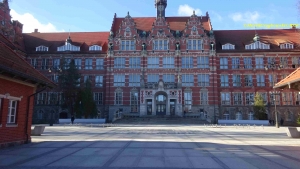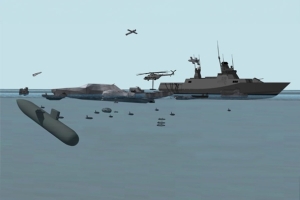ARTIFICIAL INTELLIGENCE in SPACE and at SEA CONFERENCE 23th May 2024 Gdansk University of Technology


Space Sciences Committee of the Polish Academy of Sciences, Gdansk Branch,
in cooperation with the Baltic Sea & Space Cluster
and Gdansk University of Technology
under
the honorary patronage of the Polish Space Agency
invite for a joint conference entitled
ARTIFICIAL INTELLIGENCE in SPACE and at SEA
Gdansk University of Technology, Gdansk, 23th May 2024
8.30 REGISTRATION
9.00 OPENING SESSION – chaired by Prof. dr hab. inż. Edmund Wittbrodt – President of the Space Sciences Committee of the Polish Academy of Sciences
– Welcome address to the participants by Prof. dr hab. inż. Krzysztof Wilde – Rector of Gdansk University of Technology
- dr hab. Grzegorz Wrochna – President of the Polish Space Agency
- dr hab. inż. Tadeusz Uhl – AGH University, Cracow
- dr hab. inż. Marek Moszyński – Polish Space Agency
9.50 “YOUNG STARS” SESSION – chaired by Dr. Magdalena Konopacka (to be confirmed)
– SimLE Students’s Organization, Gdańsk University of Technology – to be confirmed by Ms. Magdalena Sadowska
– The rest of participants of this session to be confirmed
The best presentation will be awarded by the President of the Space Sciences Committee
11.20 COFFEE BREAK
11.30 APPLICATIONS’ SESSION – chaired by Prof. dr hab. inż. Marek Grzybowski (to be confirmed)
– The participants of this session to be confirmed
12.50 COFFEE BREAK
13.00 RESEARCH SESSION – chaired by Prof. Mariusz Deja (to be confirmed)
– Dr. Magdalena Konopacka – University of Business and Administration, Gdynia – to be confirmed
– Dr. Paweł Chyc – University of Business and Administration, Gdynia – to be confirmed
– Prof. Marcin Dornowski – Academy of Physical Education and Sport, Gdansk – to be confirmed
– Prof. Jacek Rumiński – Faculty of Electronics, Telecommunications and Informatics, Gdańsk University of Technology – to be confirmed
– Prof. Piotr Szymak – Polish Naval Academy, Gdynia – to be confirmed
– Prof. Ryszard Kłos – Polish Naval Academy, Gdynia – to be confirmed
– Prof. Marek Galewski – Gdansk University of Technology – to be confirmed
– Prof. Krzysztof Lipiński – Gdansk University of Technology – to be conformed
– Prof. Krzysztof Falkowski – Military University of Technology, Warsaw – to be confirmed
– Dr. Eng. Dariusz Rykaczewski, Dr. Eng. Marcin Chodnicki – Air Force Institute of Technology, Warsaw – to be confirmed
– Prof. Mirosław K. Gerigk, Dr. Marek Chodnicki – A novel hybrid unmanned platform design towards obtaining a semi-autonomous application in operation, Gdańsk University of Technology
15.00 DISCUSSION AND CLOSING SESSION – by Prof. Edmund Wittbrodt
and Prof. Zdzisław Brodecki
